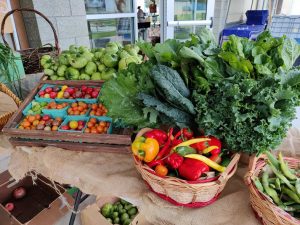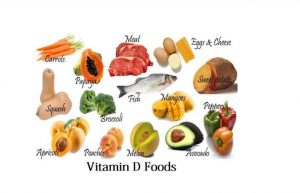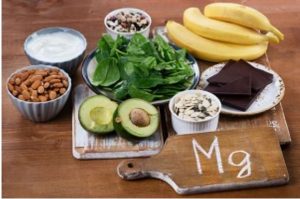In the short term, inflammation is a healthy and natural immune system response to a perceived threat. Swelling around a twisted joint or skin infection is a sign that our bodies are working to rebuild tissue and get rid of harmful bacteria. But in the long term, chronic inflammation depresses the immune system and leaves us vulnerable to disease. The good news: we have the power to reduce inflammation through simple adaptations to our diet, lifestyle and mindset.

Dr. Jennifer Penrose, owner of Penrose & Associates Physical Therapy in Lacey, suggests the following modifications that can bolster our immune systems as flu season approaches.
Eliminate or reduce processed foods and sugar. Many of the foods we eat promote inflammation, including those that are high in saturated and trans fats, such as red meat, and foods that contain partially hydrogenated oils. White rice and bread contain sugar and refined carbohydrates which also cause inflammation, as do margarine and cooking oils such as corn, safflower and sunflower oils.
“There are a lot of things we don’t have control over right now, but you do have control over what you purchase,” says Penrose. “If you eat more vegetables and less processed food and sugar, you’re going to go into this flu season healthier because it will decrease your systemic inflammation and boost your immune system. That’s one of the easiest things people can do.”
Foods that reduce inflammation include:
- Mushrooms like white button mushrooms, cremini, portabella, porcini, and shiitake mushrooms. These mushrooms contain compounds called beta-glucans, which increase the function of the immune response and your natural killer cells and T-Cells.
- Broccoli
- Garlic
- Fatty fish like salmon, herring and sardines are high in Vitamin D. Vitamin D is needed for proper immune function.
- Ginger
- Spinach
- Turmeric
- Green tea
- Oranges (citrus fruits for Vitamin C)
- Chicken soup
- Echinacea. It reduces cytokines, enhances T cells and the antibody responses
- Elderberry
- Reishi mushroom
- Ginseng
- More fiber and more vegetables! Eat a variety of color and 9-12 servings of veggies per day. Don’t get in the habit of having the same thing every day for breakfast, lunch and dinner. Mix it up to get the various nutrients from various fruits and veggies.
Manage stress. Stress contributes to inflammation by flooding the bloodstream with cortisol, also known as the fight or flight hormone. Chronic stress means our bodies’ cortisol receptor sites get overused, causing our immune systems to be depressed along with other negative health impacts.

2020 has been a highly stressful year for most people but although we can’t necessarily change our circumstances, it would be wise to regulate how we think about them, according to Penrose. “It’s important to figure out ways to cope so that you’re not constantly releasing more cortisol,” she adds. “You can control your thoughts and your attitude. Keep thinking about things that are within your control. Instead of focusing on what you can’t do because of COVID-19, think about what you can do and what you’re grateful for.”
Simply being aware of our thoughts is a good starting point and noting how much time we spend on negative ideas versus positive ones. “It’s not that you should ignore the losses that people are experiencing,” says Penrose. “You have to acknowledge those, but don’t stay there.”
Finding a new routine to replace former activities can also help. “I see a lot of people who are struggling because they can’t go to the gym,” says Penrose. “They’re stuck in ‘I can’t.’ Let’s talk about what you can do instead. How can we establish a new routine? Finding alternatives gets people out of feeling stuck and waiting for ‘normal’ to return.” We are helping lots of people establish a good, solid workout plan at home with mostly body weight, free weights, and bands. If you don’t know where to start please contact us for a free 15-minute discovery session to see if this is the right first step.

Taking supplements. Up to 75% of Americans are deficient in magnesium, a mineral that regulates cortisol and reduces stress. “It helps with sleep, muscle cramps and cognitive health because you need magnesium for neurotransmitters,” says Penrose. “There are so many benefits to magnesium.”
Vitamin C enhances the cells that kill pathogens such as bacteria and viruses, a critical factor during flu season. Vitamin D also plays a key role in activating the white blood cells that are essential to immune response. “Most of us are low on Vitamin D, even more so as we get into our gray winters,” says Penrose.
Zinc prevents virus replication and calcium supports T-Cells, the cells that focus on specific foreign particles in our bodies and as such play a central role in immune response. “If you’re taking a good multivitamin, it should have enough calcium,” says Penrose. Echinacea, elderberry and ginseng also have antioxidant properties that reduce inflammation.
Between eating healthy foods, becoming aware of how we think about our experiences, and supplementing our diet with vitamins and minerals, there are many ways to reduce inflammation and support our immune systems as we enter flu season. “There are a lot of things that people can do,” says Penrose. “It starts with establishing good, healthy routines.”
For more information or to schedule an appointment with the Penrose Team, visit the Penrose & Associates Physical Therapy website or call them at 360-456-1444.
Sponsored




















































